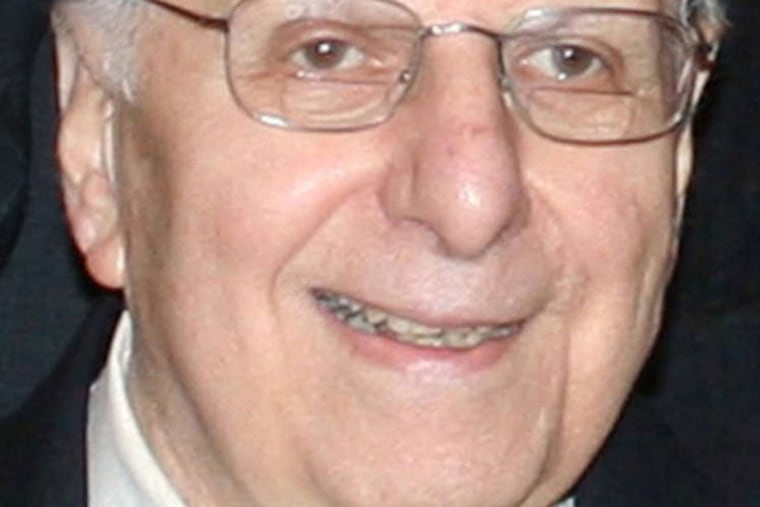Alfred Mayer Sellers, 89, prominent University of Pennsylavnia Medical School professor.
He developed pioneering treatments for high blood pressure, and never forgot his service as a combat medic in World War II.

LAST JUNE 1, there was a most unusual ceremony in an apartment in Gladwyne's Waverly Heights.
There sat a distinguished looking 88-year-old gentleman dressed incongruously in cap and gown, and there stood Teresa Soufas, dean of Temple University's College of Liberal Arts, and vice dean Jayne Drake, both in full academic regalia.
They were there to give Alfred Mayer Sellers a long-delayed bachelor's degree.
What made the occasion even more incongruous was the fact that Alfred M. Sellers was Dr. Alfred Sellers, a prominent cardiologist, researcher and professor at the University of Pennsylvania School of Medicine.
But Dr. Sellers, who died May 16 at the age of 89, had never completed his undergraduate degree at Temple.
By an odd confluence of circumstances - not least of which was World War II - Sellers had more or less dropped out of Temple in 1948 when an opportunity arrived to attend Duke University Medical School.
He had accumulated more than enough credits to graduate from Temple, but he never did. He went on to graduate first in his class at Duke in 1951, and eventually become a nationally known cardiologist and pioneer in the treatment of high blood pressure.
But whenever Sellers had to fill out a personnel form of any kind, next to the space for "Undergraduate Degree," he had to write "Incomplete."
A thing like that can get to a man after a while. It haunted Alfred Sellers throughout his long and distinguished career in medicine, until he decided to do something about it.
He wrote to Temple years ago, asking that his undergraduate degree be granted retroactively. He was denied.
Fortunately, saner heads eventually prevailed and the paperwork was completed, leading to the unusual ceremony in Sellers' apartment, which a university spokesperson called "one of the most memorable commencements" in school history.
Dr. Sellers was once asked to identify the most life-altering event in his life. Without hesitation, he replied that it was the Battle of the Bulge in 1944.
"I realized that if I could survive that, I could survive anything," he said.
Young Alfred was a combat medic in the 4th Armored Division, part of Gen. George S. Patton's 3rd Army. Wounded men cried "Medic!" and Alfred and the other medics went running.
The first wounded man he encountered had been shot by a sniper. He ran to help him but as he was about to treat his wound, the man died. It left an indelible impression on the young medic, but it was only the beginning of what he would encounter in Belgium when the German Army made a breakthrough at Bastogne in December 1944, launching the critical Battle of the Bulge.
Once, looking for a place to put wounded men, Alfred found a railroad shed. But the enemy scored a direct hit and the building collapsed on him and the wounded.
By then, his feet had frozen and he was evacuated. He served the rest of the war in England, where one of his duties was to treat German prisoners of war.
Finally back in the U.S., Alfred was anxious to finish his studies at Temple. He was only a few classes from graduation when an uncle talked him into applying to Duke's medical school. He did and was accepted.
He received both his medical degree and a bachelor's in medicine from Duke. He completed his internship and residency in internal medicine at the Hospital of the University of Pennsylvania. He became clinical assistant professor of medicine in 1959 and clinical associate professor of medicine in 1966.
From 1975 until his retirement in 2008, he was associate professor of medicine at Penn, and for 10 years, chief of its hypertension unit.
Sellers became nationally known through his research in the treatment of hypertension. He was a member of a team at Penn in the 1950s that developed a surgical procedure - bilateral adrenal-gland removal - that proved to be lifesaving for patients with malignant hypertension. It was a time when there was no orally effective blood pressure medication.
He published a total of 66 articles in various medical journals over the years, and estimated he saw 10,000 patients in his nearly 60 years of practice - all at Penn.
In 1952, Sellers married Helen Obermayer, daughter of Leon Obermayer, a prominent lawyer and former president of the Philadelphia Board of Education.
The family lived in Penn Valley for 51 years before moving to Waverly Heights retirement community in Gladwyne.
His wife died in 1995. He is survived by two sons, David and Joseph, and four grandchildren.
Services: Memorial service 11 a.m. today at Congregation Rodeph Shalom, 615 N. Broad St. Burial will be private.
Donations in his memory may be made to the Waverly Foundation Scholarship Fund, 1400 Waverly Road, Gladwyne, Pa. 19035, or the Helen O. Sellers Fund, Rodeph Shalom, 615 N. Broad St., Philadelphia 19123.